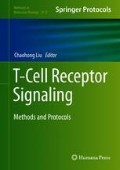Abstract
Phytochemicals are the basis for many anticancer drugs currently in clinical use, as well as a potential source of future cancer treatments. Some phytochemicals have been found to modify the expression of checkpoint inhibitors of the immune response, as well as kill cancer cells. Cancer cells, in turn, may evade detection by the immune system by expressing molecules such as programmed death ligand 1 (PD-L1) that interacts with programmed cell death 1 (PD-1) on T cells to inhibit T cell activation and effector function. Phytochemicals have direct effects on cancer cells and/or T cells that may impact PD-L1/PD1 interactions, although this may vary depending on the phytochemical in question. Flow cytometric analysis of cancer cells stained with anti-PD-L1 antibodies following treatment with a given phytochemical enables the detection of any alteration in PD-L1 expression. The effect of the phytochemical on T cell function can be assessed using proliferation assays (e.g., tritiated thymidine incorporation, flow cytometric analysis of Oregon Green 488-stained cells) and enzyme-linked immunosorbent assay of interleukin-2 content in culture supernatants. Additional study is needed to better understand the impact of phytochemicals on cancer immunotherapy.
Access this chapter
Tax calculation will be finalised at checkout
Purchases are for personal use only
References
Forward NA, Conrad DM, Power Coombs MR, Doucette CD, Furlong SJ, Lin T-J, Hoskin DW (2011) Curcumin blocks interleukin (IL)-2 signaling in T-lymphocytes by inhibiting IL-2 synthesis, CD25 expression, and IL-2 receptor signaling. Biochem Biophys Res Commun 407:801–806
Yaffe PB, Power Coombs MR, Doucette CD, Walsh M, Hoskin DW (2015) Piperine, an alkaloid from black pepper, inhibits growth of human colon cancer cells via G1 arrest and apoptosis triggered by endoplasmic reticulum stress. Mol Carcinog 54:1070–1085
Harrison ME, Power Coombs MR, Delaney LM, Hoskin DW (2014) Exposure of breast cancer cells to a subcytotoxic dose of apigenin causes growth inhibition, oxidative stress, and hypophosphorylation of Akt. Exp Mol Pathol 97:211–217
Bernard M, Furlong SJ, Power Coombs MR, Hoskin DW (2015) Differential inhibition of T lymphocyte proliferation and cytokine synthesis by [6]-gingerol, [8]-gingerol, and [10]-gingerol. Phytother Res 29:1707–1713
Fernando W, Coombs MRP, Hoskin DW, Rupasinghe HPV (2016) Docosahexaenoic acid-acylated phloridzin, a novel polyphenol fatty acid ester derivative, is cytotoxic to breast cancer cells. Carcinogenesis 37:1004–1013
Coombs MRP, Harrison ME, Hoskin DW (2016) Apigenin inhibits the inducible expression of programmed death ligand 1 by human and mouse mammary carcinoma cells. Cancer Lett 380:424–433
Knekt P, Järvinen R, Seppänen R, Heliövaara M, Teppo L, Pukkala E, Aromaa A (1997) Dietary flavonoids and the risk of lung cancer and other malignant neoplasms. Am J Epidemiol 146:223–230
Hertog MG, Feskens EJ, Hollman PC, Katan MB, Kromhout D (1994) Dietary flavonoids and cancer risk in the Zutphen elderly study. Nutr Cancer 22:175–184
Bosetti C, Spertini L, Parpinel M, Gnagnarella P, Lagiou P, Negri E, Franceschi S, Montella M, Peterson J, Dwyer J, Giacosa A, Vecchia CL (2005) Flavonoids and breast cancer risk in Italy. Cancer Epidemiol Prev Biomark 14:805–808
Canadian Cancer Society’s Advisory Committee on Cancer Statistics (2017) Canadian Cancer Statistics 2017. Toronto, ON: Canadian Cancer Society
Pedro C, Mira B, Silva P, Netto E, Pocinho R, Mota A, Labareda M, Magalhães M, Esteves S, Santos F (2018) Surgery vs. primary radiotherapy in early-stage oropharyngeal cancer. Clin Transl Radiat Oncol 9:18–22
Maughan KL, Lutterbie MA, Ham PS (2010) Treatment of breast cancer. Am Fam Physician 81:1339–1346
Yousefi H, Yuan J, Keshavarz-Fathi M, Murphy JF, Rezaei N (2017) Immunotherapy of cancers comes of age. Expert Rev Clin Immunol 13:1001–1015
Peters S, Reck M, Smit EF, Mok T, Hellmann MD (2019) How to make the best use of immunotherapy as first-line treatment for advanced/metastatic non-small-cell lung cancer. Ann Oncol 30:884–996
Esteva FJ, Hubbard-Lucey VM, Tang J, Pusztai L (2019) Immunotherapy and targeted therapy combinations in metastatic breast cancer. Lancet Oncol 20:e175–e186
Donini C, D’Ambrosio L, Grignani G, Aglietta M, Sangiolo D (2018) Next generation immune-checkpoints for cancer therapy. J Thorac Dis 10:S1581–S1601
Alsaab HO, Sau S, Alzhrani R, Tatiparti K, Bhise K, Kashaw SK, Iyer AK (2017) PD-1 and PD-L1 checkpoint signaling inhibition for cancer immunotherapy: mechanism, combinations, and clinical outcome. Front Pharmacol 8:561
Garcia-Lora A, Martinez M, Algarra I, Gaforio JJ, Garrido F (2003) MHC class I-deficient metastatic tumor variants immunoselected by T lymphocytes originate from the coordinated downregulation of APM components. Int J Cancer 106:521–527
Aguiar PN, De Mello RA, Hall P, Tadokoro H, de Lima Lopes G (2017) PD-L1 expression as a predictive biomarker in advanced non-small-cell lung cancer: updated survival data. Immunotherapy 9:499–506
Yin S-Y, Yang N-S, Lin T-J (2017) Phytochemicals approach for developing cancer immunotherapeutics. Front Pharmacol 8:386
Apert C, Romagnoli P, van Meerwijk JPM (2018) IL-2 and IL-15 dependent thymic development of Foxp3-expressing regulatory T lymphocytes. Protein Cell 9:322–332
Author information
Authors and Affiliations
Corresponding author
Editor information
Editors and Affiliations
Rights and permissions
Copyright information
© 2020 Springer Science+Business Media, LLC, part of Springer Nature
About this protocol
Cite this protocol
Power Coombs, M.R., Hoskin, D.W. (2020). Assessing the Impact of Phytochemicals on Immune Checkpoints: Implications for Cancer Immunotherapy. In: Liu, C. (eds) T-Cell Receptor Signaling. Methods in Molecular Biology, vol 2111. Humana, New York, NY. https://doi.org/10.1007/978-1-0716-0266-9_14
Download citation
DOI: https://doi.org/10.1007/978-1-0716-0266-9_14
Published:
Publisher Name: Humana, New York, NY
Print ISBN: 978-1-0716-0265-2
Online ISBN: 978-1-0716-0266-9
eBook Packages: Springer Protocols

